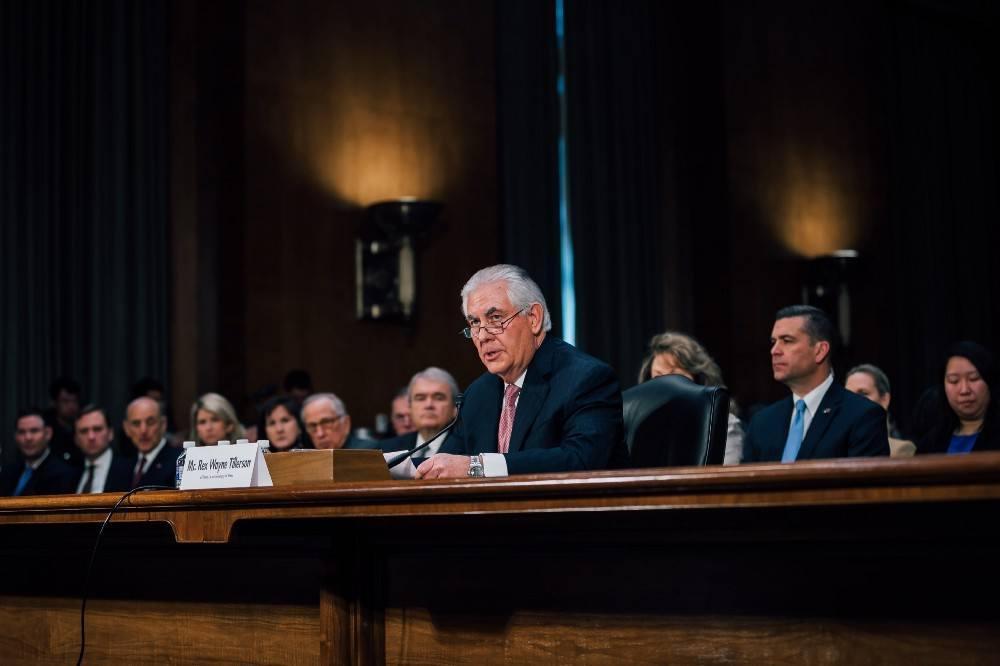
Recollections – or the lack thereof -- can say a lot about the way people look at things. That’s why when former Exxon CEO Rex Tillerson was questioned about his company’s alleged skirting of U.S. sanctions against financial dealings with Iran, Syria and Sudan, Sens. Jeff Merkely (D-Ore.) and Robert Menendez (D-N.J) found his recollections a bit odd. Or, that is, his lack of memory when it came to Exxon’s $55 million revenue from projects in these three countries from 2004 to 2006, a period that overlaps Tillerson’s tenure at Exxon.
The 64-year-old former head of the world’s largest oil and gas company was undergoing his confirmation hearings for the position of U.S. secretary of state at the time of the questioning. He was forthright, almost adamant, about the role and importance of sanctions as a tool for ensuring compliance (for example when it comes to human rights compliance). But when questioned about the fact that ExxonMobil had done business that gained direct financial benefit from countries on the U.S. sanctions list, he drew a blank.
“I do not recall the details of the circumstances around what you just described,” Tillerson told Merkely and Menendez when they asked why Exxon sold chemicals to the Iranian National Oil Co. The company was listed by the U.S. Treasury Department as an affiliate of the Iranian Revolutionary Guard Corps, an organization the U.S. said was a sponsor of terrorism.
“The question would have to go to ExxonMobil for them to be able to answer that,” Tillerson said.
The next day, Exxon did. The corporation’s spokesperson Alan Jeffers stated that the transactions were actually between a European company Infineum and Iran, and that Infineum was an “independently managed” company.
Independently managed, but owned in an even split by ExxonMobil and Royal Dutch Shell. Although Infineum did the financial bidding, ExxonMobil is estimated to have benefited in the millions from transactions the company did in Iran, Syria and Sudan.
Nor was the $55 million ever disclosed to shareholders. According to documents obtained by the Washington Post, in 2006 Exxon’s legal counsel told the Securities and Exchange Commission the firm wouldn’t inform shareholders of this new revenue – it was too small for investors of the world’s largest oil and gas company to worry about. It’s a position that Exxon maintained throughout much of its dealings with the SEC over this revenue. For its part, the SEC doggedly insisted that the investors should be informed of these undisclosed material transactions.
While Tillerson’s lack of memory and willingness to talk about these events have frustrated Democrats, the impasse likely isn’t enough to stand in the way of a confirmation. For Tillerson to lose the nomination, there would have to be a reason compelling enough to force one or two Republicans to vote against his confirmation.
And there just might be.
On Wednesday, Sen. Marco Rubio grilled Tillerson on his views about Russia, President Vladimir Putin, and the role the secretary of state would play when it comes to human rights in the global arena.
Rubio seemed less than convinced that Tillerson understood the weight his role would carry in representing the interests of the United States. He was almost prosaic in the summary he later gave Tillerson about why he asked him about the role that his office would play and his earnest decision to make sure those responsibilities were upheld.
“[The secretary of state] is the face of this country for billions of people, for hundreds of millions of people, as well, and particularly for people that are suffering and they’re hurting.
“For those people, those 1,400 people in jail in China, those dissidents in Cuba, the girls that want to drive and go to school, they look to the United States. They look to us and often to the secretary of state,” said Rubio, noting that these people expect the United States to take a decisive stand on issues of human rights.
When we don’t, he insisted: "It demoralizes these people all over the world. And it leads people to conclude this -- which is damaging, and it hurt us during the Cold War -- and that is this: America cares about democracy and freedom — as long as it’s not being violated by someone that they need for something else.
“That cannot be who we are in the 21st century,” Rubio concluded.
With new information surfacing about lawsuits ExxonMobil is facing for its alleged complicity in torture of Indonesian farmers in the late 1990s and early 2000s, new questions are emerging about what Tillerson would have known and handled as an executive vice president of ExxonMobil.
And with Rubio’s keen interest in ensuring that the country’s top diplomatic office is able and willing to interpret and address human rights issues fairly, Tillerson’s confirmation seems to be anything but a sure thing. The decision that determines whether Donald Trump’s top nominee is confirmed may not lie in the hands of Democrats after all, but under the purview of a Republican senator earnestly bent on reminding Trump of what really defines the country’s top leadership roles.
Image credit: The Office of the President-elect via Wikimedia Commons
Jan Lee is a former news editor and award-winning editorial writer whose non-fiction and fiction have been published in the U.S., Canada, Mexico, the U.K. and Australia. Her articles and posts can be found on TriplePundit, JustMeans, and her blog, The Multicultural Jew, as well as other publications. She currently splits her residence between the city of Vancouver, British Columbia and the rural farmlands of Idaho.














